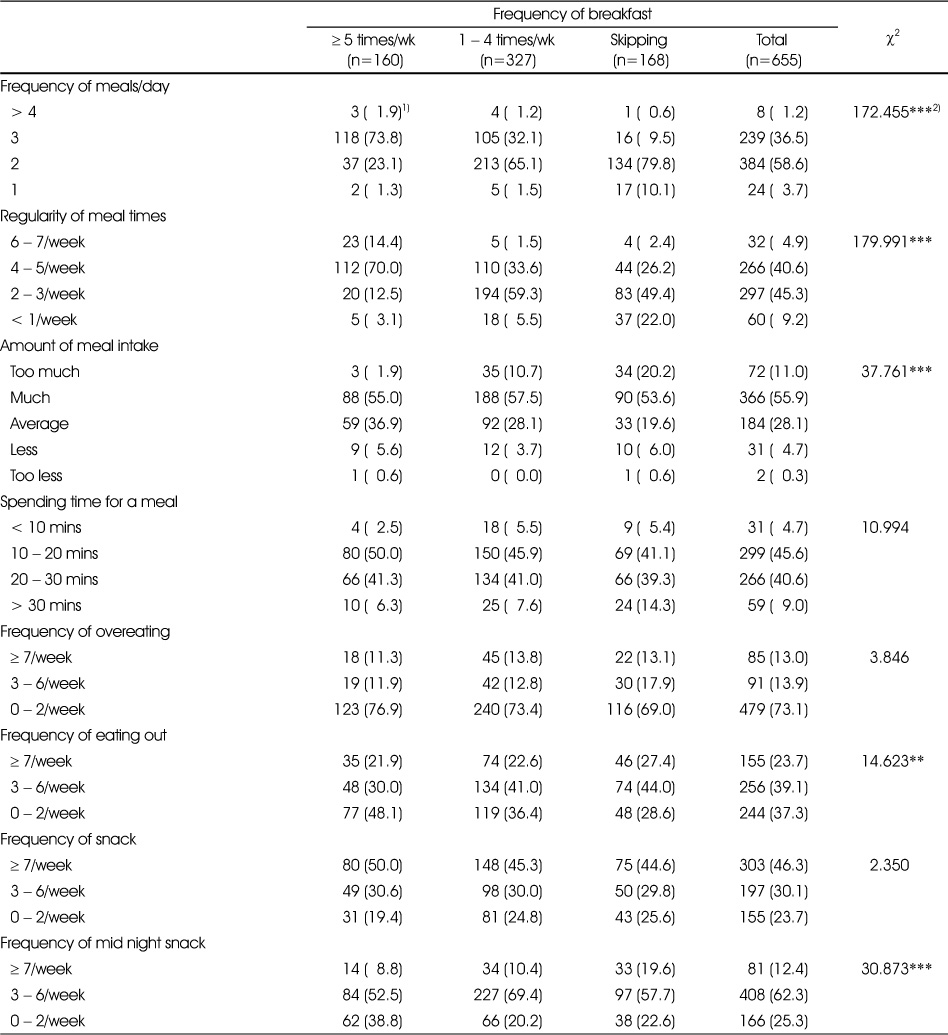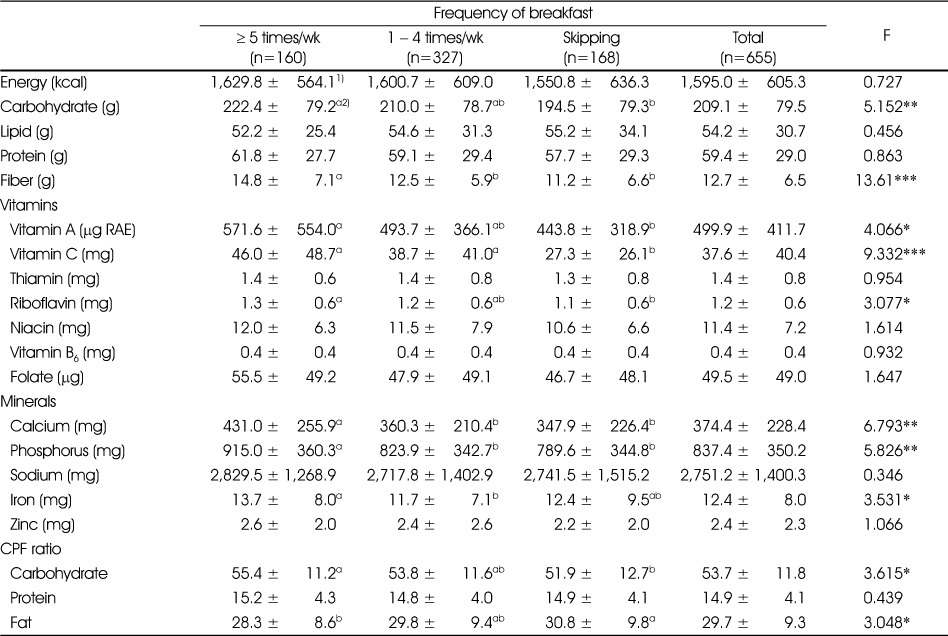References
1. Lee SH, Shim JS, Kim JY, Moon HA. The effect of breakfast regularity on eating habits, nutritional and health status in adults. Korean J Nutr 1996;29(5):533–546.
2. Kim SH. Children's growth and school performance in relation to breakfast. J Korean Diet Assoc 1999;5(2):215–224.
3. Ma Y, Bertone ER, Stanek EJ 3rd, Reed GW, Hebert JR, Cohen NL. Association between eating patterns and obesity in a free-living US adult population. Am J Epidemiol 2003;158(1):85–92.
4. Park SA, Park HA. Meal regularity is associated with nutrient adequacy and cardiovascular risk factors in Korean adults. Korean J Health Promot 2010;10:53–60.
5. Wyatt HR, Grunwald GK, Mosca CL, Klem ML, Wing RR, Hill JO. Long-term weight loss and breakfast in subjects in the National Weight Control Registry. Obes Res 2002;10(2):78–82.
6. Azadbakht L, Haghighatdoost F, Feizi A, Esmaillzadeh A. Breakfast eating pattern and its association with dietary quality indices and anthropometric measurements in young women in Isfahan. Nutrition 2013;29(2):420–425.
7. Kang SH. Impacts of higher elementary grades' breakfasting and eating habits on their learning [Master thesis] YoungNam University; 2013.
8. Rha YA, Kang MJ, Lee SH, Kim JY. Nutrition intake according to food and exercise habits in female college students of Yang-Ju si. Korean J Culinary Res 2015;21(4):284–293.
9. Bae YJ, Kim EY, Yeon JY, Cho HK, Lee JS, Kim MH. Evaluation of dietary behavior, nutrient and food intake status, and dietary quality based on Diet Quality Index-International (DQI-I) in female university students. J East Asian Soc Diet Life 2010;20(4):491–501.
10. Reeves S, Huber JW, Halsey LG, Horabady-Farahani Y, Ijadi M, Smith T. Experimental manipulation of breakfast in normal and overweight/obese participants is associated with changes to nutrient and energy intake consumption patterns. Physiol Behav 2014;133:130–135.
11. Korea Centers for Disease Control and Prevention (KCDC). Korea Health Statistics 2016: Korea National Health and Nutrition Examination Survey (KNHANES VII-1) Korea Centers for Disease Control and Prevention (KCDC); 2017. 12. Report No. 11-1351159-000027-10.
12. Yun S, Jeong HR, Kim MH. A survey on the breakfast skipping rate of Korean adults relative to their lifestyle and breakfast skipping reasons and dietary behavior of breakfast skippers. Korean J Community Nutr 2010;15(2):191–205.
13. Bae YJ, Lee JC, Kim MH. Nutritional status and dietary quality of college students by residing types in Samcheok. J Korean Diet Assoc 2007;13(4):311–330.
14. Kim JH, Ahn HJ, Lee SE. Body composition, food intake and clinical blood indices of female college students. Korean J Community Nutr 2003;8(6):977–985.
15. Kim MH, Lee JC, Bae YJ. The evaluation study on eating behavior and dietary quality of elderly people residing in Samcheok according to age group. Korean J Community Nutr 2009;14(5):495–508.
16. Lee HY. A survey on breakfast of commuting local college students and suggestions for desirable breakfast menu. Korean J Food Nutr 1998;11(3):323–328.
17. Lee JS, Chung HJ. A study of female college student's breakfast behavior and ideal breakfast type. Korean J Diet Cult 2001;16(4):378–387.
18. Jo JS. Development of a questionnaire for dietary habit survey of Korean adults [Dissertation] Chunbuk National University; 2013.
19. Jeong KJ, Lee JH, Kim MH. A study on the nutrition knowledge, dietary behaviors, and dietary habits according to the gender in high school students in Chungnam area. Korean J Food Nutr 2014;27(3):458–469.
20. Koo JO, Park SY. Analysis of BMI, body composition, weight control, dietary behaviors of adult women. Korean J Community Nutr 2011;16(4):454–465.
21. Cho JY, Song JC. Dietary behavior, health status, and perceived stress of university students. Korean J Food Nutr 2007;20(4):476–486.
22. Bae YJ, Lee JC, Kim MH. Nutritional status and dietary quality of college students by residing types in Samcheok. J Korean Diet Assoc 2007;13(4):311–330.
23. Kim YS, Kim BR. Study on BMI, dietary behavior, and nutrient intake status according to frequency of breakfast intake in female college students in Chuncheon area. J Korean Soc Food Sci Nutr 2017;46(10):1234–1242.
24. Tin SP, Ho SY, Mak KH, Wan KL, Lam TH. Lifestyle and socioeconomic correlates of breakfast skipping in Hong Kong primary 4 schoolchildren. Prev Med 2011;52(3):250–253.
25. Lee JS, Song JE. Nutritional status of Korean middle-age adults according to breakfast frequency: Based on the 2015 Korean national health and nutrition examination survey. Korean J Food Nutr 2017;30(4):644–652.
26. Jang SH, Suh YS, Chung YJ. Metabolic risk and nutritional state according to breakfast energy level of Korean adults: Using the 2007-2009 Korea national health and nutrition examination survey. J Nutr Health 2015;48(1):46–57.
27. Van der Heijden AA, Hu FB, Rimm EB, van Dam RM. A prospective study of breakfast consumption and weight gain among U.S. men. Obesity 2007;15(10):2463–2469.
28. Odegaard AO, Jacobs DR Jr, Steffen LM, Van Horn L, Ludwig DS, Pereira MA. Breakfast frequency and development of metabolic risk. Diabetes Care 2013;36(10):3100–3106.
29. Park S, Hyun TS, Lee HM. Weight control behaviors, health-related quality of life and nutritional status by overestimation of body image among young Korean females: Data from the Fifth Korea National Health and Nutrition Examination Survey, 2010-2011. Korean J Community Nutr 2015;20(5):362–374.
30. Kim SH. A survey on daily physical activity level, energy expenditure and dietary energy intake by university students in Chungnam province in Korea. J Nutr Health 2013;46(4):346–356.
31. Woo LJ, Kim SY. Eating behaviors by breakfast frequency of high school students in Yongin area. J Korean Soc Food Sci Nutr 2015;44(1):66–75.
32. Kim BR, Kim YM. A study on the food habits and the evaluation of nutrient intakes of high school students in Chuncheon. J Korean Home Econ Educ Assoc 2005;17(3):35–52.
33. You JS, Kim SM, Change KJ. Nutritional knowledge and dietary behavior of the 6th grade elementary school students in Daejeon area by gender and skipping breakfast. Korean J Nutr 2009;42(3):256–267.
34. Kim YS, Kim BR. A study on nutrition knowledge, dietary behaviors and evaluation of nutrient intakes of high school female students in Chuncheon area by frequency of breakfast. J Korean Home Econ Educ Assoc 2012;24(4):91–104.
35. Kim YS, Kim BR. Nutrient intake status of male and female university students in Chuncheon area. J Korean Soc Food Sci Nutr 2015;44(12):1856–1864.
36. Yang SJ, Kim KR, Hwang JY. Effect of ‘Breakfast Club Program’ on dietary behaviors and school life in high school students residing in Seoul metropolitan areas. J Korean Soc Food Sci Nutr 2015;44(7):1000–1006.
37. Yi YH, Kim YJ, Lee SY, Lee JG, Jeong DW, Cho YH. The correlation of meal frequency and nutrition with mental health status in women aged 20-39 years: The 5th Korea national health and nutrition examination survey, 2010-2012. Korean J Obes 2015;24(2):101–107.
38. Haire Joshu D, Schwarz C, Budd E, Yount BW, Lapka C. Postpartum teens' breakfast consumption is associated with snack and beverage intake and body mass index. J Am Diet Assoc 2011;111:124–130.
39. Choi MJ, Lee YS. Nutrient intake and body composition analysis according to food habits in college females in Daegu area. J East Asian Soc Diet Life 2014;24(1):42–52.
40. Azadbakht L, Haghighatdoost F, Feizi A, Esmaillzadeh A. Breakfast eating pattern and its association with dietary quality indices and anthropometric measurements in young women in Isfahan. Nutrition 2013;29(2):420–425.
41. Bae YJ. Evaluation of nutrient intake and meal variety with breakfast eating in Korean adolescents: Analysis of data from the 2008-2009 National Health and Nutrition Survey. Korean J Community Nutr 2013;18(3):257–268.
42. Bae HS, Cho YH, Kim JY, Ahn HS. Comparison of nutrient intake and antioxidant status in female college students by skin types. Korean J Community Nutr 2006;11(1):63–71.
43. Han BR, Bae HS. Development and evaluation of the semi-quantitative food frequency questionnaire to assess folate intake in women of child-bearing age. Korean J Community Nutr 2012;17(2):156–166.
44. Lim HS. Nutritional factors of the women of reproductive age and pregnancy outcome. Korean J Community Nutr 2002;7(6):894–906.








